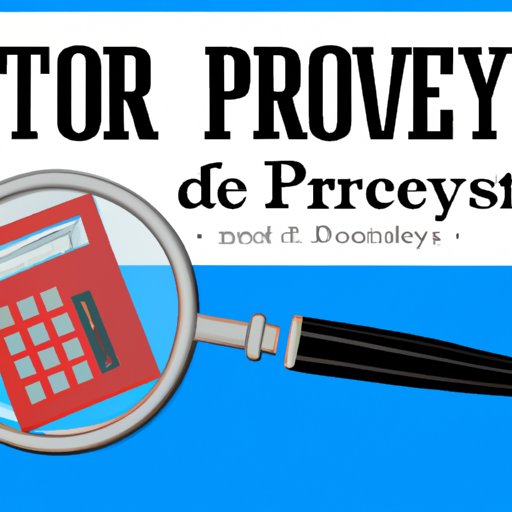Introduction
Whether you’re considering buying a home, looking to resolve a dispute with a neighbor, or simply curious about the ownership history of a particular property, knowing who owns a property is an important first step.
In this article, we’ll explore several different ways to find out who owns a property.
Conduct a Title Search
If you’re looking for detailed information about a property, conducting a title search is a good place to start. A title search will reveal information about the property’s ownership history, such as past sales, liens, and other encumbrances.
To conduct a title search, you’ll need to visit the county clerk’s office in the county where the property is located. There, you’ll be able to search through land records, which will include information about the property’s ownership history.
When conducting a title search, it’s important to understand the terminology used in land records, such as “grantor” (the person selling the property) and “grantee” (the person buying the property). You should also be aware that land records may contain errors or omissions.
Check the Tax Records
Another way to find out who owns a property is to check the tax records. Property tax records are typically kept by the county or city assessor’s office. These records will provide information about the current owner of the property, as well as the property’s tax assessment history.
When searching tax records, it’s important to understand that the property may be listed under a different name than the current owner, such as an LLC or trust. Additionally, tax records may not always be up-to-date or accurate.
Use an Online Property Search Tool
There are several online property search tools that can help you find out who owns a property. These tools allow you to search by address or parcel number and can provide information about the property’s ownership history, tax assessment history, and other related information.
Some online property search tools are free, while others require a fee or subscription. It’s important to carefully evaluate these tools and understand what information they provide before paying for a subscription.
Contact the County Clerk’s Office
The county clerk’s office may have access to more information about a property than what is available to the public or online databases. This may include information about past sales, liens, and other encumbrances.
If you’re having trouble finding information about a property through other means, you may want to consider contacting the county clerk’s office directly. Be prepared to provide specific details about the property, such as its address or parcel number, to help the clerk locate the information you need.
Hire a Private Investigator
In some cases, it may be necessary to hire a private investigator to find out who owns a property. Private investigators may be able to access information that is not available to the general public or online databases.
When hiring a private investigator, it’s important to do your research and find a reputable firm with experience in real estate investigations. You should also be prepared to pay a fee for their services.
Conclusion
There are several different methods for finding out who owns a property, including conducting a title search, checking tax records, using an online property search tool, contacting the county clerk’s office, and hiring a private investigator. Each method has its own strengths and weaknesses, and some may be more appropriate than others depending on your specific situation.
Regardless of which method you choose, it’s important to be persistent and patient when attempting to locate a property owner. With dedication and the right resources, you can find the information you need to move forward with your goals.
